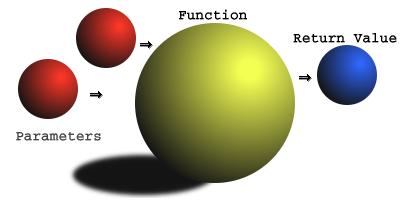

Functions represent logical blocks of code which are called upon
by programs to perform some particular task.
In some cases, the program which calls the function may be required
to send information to it and the function
may in turn return information when it has completed its duties.
The data passed to the function are known as
parameters. In C (and many other languages) functions
may only return at most one value. They can however
return pointers to blocks of data in memory, or, manipulate values
in a block of memory whose address had been
passed by the calling program. If a function does return a value
directly, its return type is 'void'.
int MyAddition(int Value1, int Value2);
void main()
{
int FirstValue;
int SecondValue;
int Result;
FirstValue = 1;
SecondValue = 2;
Result = MyAddition(FirstValue, SecondValue);
}
int MyAddition(int Value1, int Value2)
{
return ( Value1 + Value2 );
}
The first line of this small program is a prototype or forward declaration
of the function MyAddition. The
reason it is necessary is as follows:
When the compiler reaches the point in the code where the function MyAddition
is called, it needs to know
if you (the programmer) have programmed it correctly i.e. have you
passed the correct number and type of
parameters. The only way it can know this is if you have told
it previously that this particular function takes
two integers as arguments. The function prototype does this.
Later on in the code, perhaps after the main function, you can type
in the actual c-code which makes up your
function. If your program makes use of many functions, it may
be more convenient to use a header file which
includes all of the prototypes for these functions. This header
file can then be included at the top of any of your
program files, thus saving you the effort of entering and maintaining
a long list of function prototypes in many
different files. Go and take a look at the contents of say stdio.h
in your c compiler's 'include' directory (a word
of caution: make sure you don't change this file accidentally).
You will see many function prototypes as well as
perhaps some macro definitions.
#include <stdio.h>
void MyFunction(int InputParameter);
void main()
{
int i;
i = 0;
printf("\nThe value of i is %d\n",i);
MyFunction(i);
printf("The new value of i is %d\n",i);
}
void MyFunction(int InputParameter)
{
InputParameter++; /* only the copy of i is changed,
the original is still as it was */
}
This code produces the following output on the screen:
The value of i is 0;
The value of i is 0;
and, as you can see the variable i remains unchanged.
#include <stdio.h>
void MyFunction(int &InputParameter);
void main()
{
int i;
i = 0;
printf("\nThe value of i is %d\n",i);
MyFunction(&i);
printf("The new value of i is %d\n",i);
}
void MyFunction(int &InputParameter)
{
*InputParameter++; /* Increment the integer
at the given address */
}
This code produces the following output:
The value of i is 0;
The value of i is 1;
The key difference here is that in the second case, the function is
passed the address of i. When the
function changes the integer at this address (i) it changes the value
of i in the calling program. Passing
parameter addresses like this is called passing by reference.